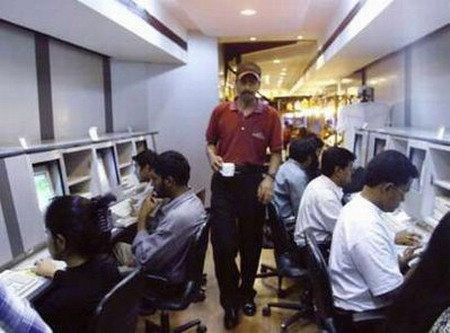BANGALORE -- For decades, the United States beckoned as the land of opportunity for bright, young Indians, lured by the prospect of prestigious university degrees followed by jobs on Wall Street or in Silicon Valley.
Indians have since 2001 been the largest foreign student population on American campuses, comprising around 15 percent of all international students at colleges and universities in the United States, according to the US Embassy in New Delhi.
|

A waiter serves coffee to college students surfing the internet at a cafe in Bangalore in this April 6, 2000 file photo. The economic crisis has tarnished the sheen of the 'American Dream' for many Indians who are opting for university studies and career opportunities at home. [Agencies]
|
But now, the economic crisis that has sent the US economy into its worst recession in decades, has tarnished the sheen of the 'American Dream' for many Indians who are opting for university studies and career opportunities at home.
America's loss may be India's gain, analysts say, pointing to a 'reverse brain drain' that may see India reaping benefits for years to come as some of its smartest and most talented people put their energies into India' economy, Asia's third-largest.
"The brain drain has already begun to reverse. Now there are many magnets pulling the best talent. Before, the US was where everyone wanted to go," said Vivek Wadhwa, a US-based Indian academic who has written a paper on the issue. India's economy has boomed at around 9 percent growth in each of the last three years, lifting millions out of poverty and creating a generation of affluent and ambitious young Indians.
Many have pursued prestigious post-graduate degrees in the US and Europe and then stayed after finding high-paying jobs.
But as the global financial crisis has kicked-in, Indians are seeing greater opportunities at home, where there are more job openings, the cost of living is lower and modern amenities such as shopping malls and condominiums offer them a comfortable life.
About 100,000 skilled Indian 'returnees' will come home from the United States in the next five years, Wadhwa estimated.
"When I joined Duke four years ago, nearly every student talked about wanting to stay and work in the US," said Wadhwa, an adjunct professor at Duke University and a senior research associate at Harvard Law School.
"Now the vast majority plan to go back home. A few want to work here to pay off their loans, but they don't think they will be able to get jobs."
With US unemployment at a 26 year high, prospects at home appear better for Indian graduates as firms such as Warner Bros and IBM announce they will move jobs to India and other outsourcing hubs after laying off workers in North America.
Financial Aid
Rahul Dutta, 23, is a case in point. He has changed his plans to study in the United States and is now enrolled at a local university.
"My initial plan was to do my master's degree there and look for a job too, but now I realize that there are no jobs and no funding, so I took admission in a college in Delhi," said Dutta.
In Bangalore, south India's high-tech metropolis, Kripa Chettiar reached the same conclusion.
"I was looking at doing a master's in financial engineering at Columbia University," Chettiar said. "But now I am not even writing the GRE because now there's no point, as there is no financial aid available at all."

